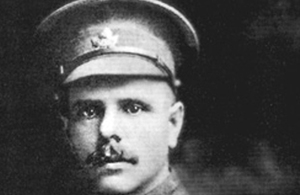WW1 Canadian VC recipient Filip Konowal
The story of Canadian First World War Victoria Cross recipient Filip Konowal.

Credit: National Defence Canada
70 men from Canada received the Victoria Cross, Britain’s highest award for gallantry, during the First World War. As part of the Centenary Commemorations the people of the United Kingdom marked their gratitude to those courageous men by presenting a bronze memorial plaque to their home country engraved with their names. The plaque is now displayed at the British High Commission Ottawa. This archive tells their stories.
Name: Filip Konowal
DOB: 25 March 1887
Place of Birth: Kedeski
Date of Action: 22 to 24 August 1917
Place of Action: Hill 70, near Lens, France
Rank: Acting Corporal
Regiment: British Columbia Regiment, Canadian Expeditionary Force
Filip Konowal was born in present-day Ukraine on 25 March 1887 but emigrated to Canada around 1913. He trained first as a bayonet instructor, before enlisting in the Canadian Expeditionary Force where he served with the 47th Infantry Battalion.
Konowal was an Acting Corporal when he was awarded the Victoria Cross for his actions on 22 to 24 August 1917 when leading his section against German resistance on Hill 70, near Lens in France. As his citation explains:
His section had the difficult task of mopping up cellars, craters and machine-gun emplacements. Under his able direction all resistance was overcome successfully, and heavy casualties inflicted on the enemy. In one cellar he himself bayonetted three enemy and attacked single-handed seven others in a crater, killing them all. On reaching the objective, a machine-gun was holding up the right flank, causing many casualties. Cpl. Konowal rushed forward and entered the emplacement, killed the crew, and brought the gun back to our lines. The next day he again attacked single-handed another machine-gun emplacement, killed three of the crew, and destroyed the gun and emplacement with explosives. This non-commissioned officer alone killed at least sixteen of the enemy, and during the two days’ actual fighting carried on continuously his good work until severely wounded.
Once he had recovered from his wounds, he was assigned to the Military Attaché at the Russian Embassy in London, before enrolling as a sergeant with the Canadian Siberian Expeditionary Force, and finally returning to Vancouver in 1919. Later in life, Konowal was made patron of the Royal Canadian Legion Branch 360, and the Legion helped to establish the “Konowal Prize”, an annual scholarship to the Royal Military College of Canada.
Konowal died in Ottawa in 1959.